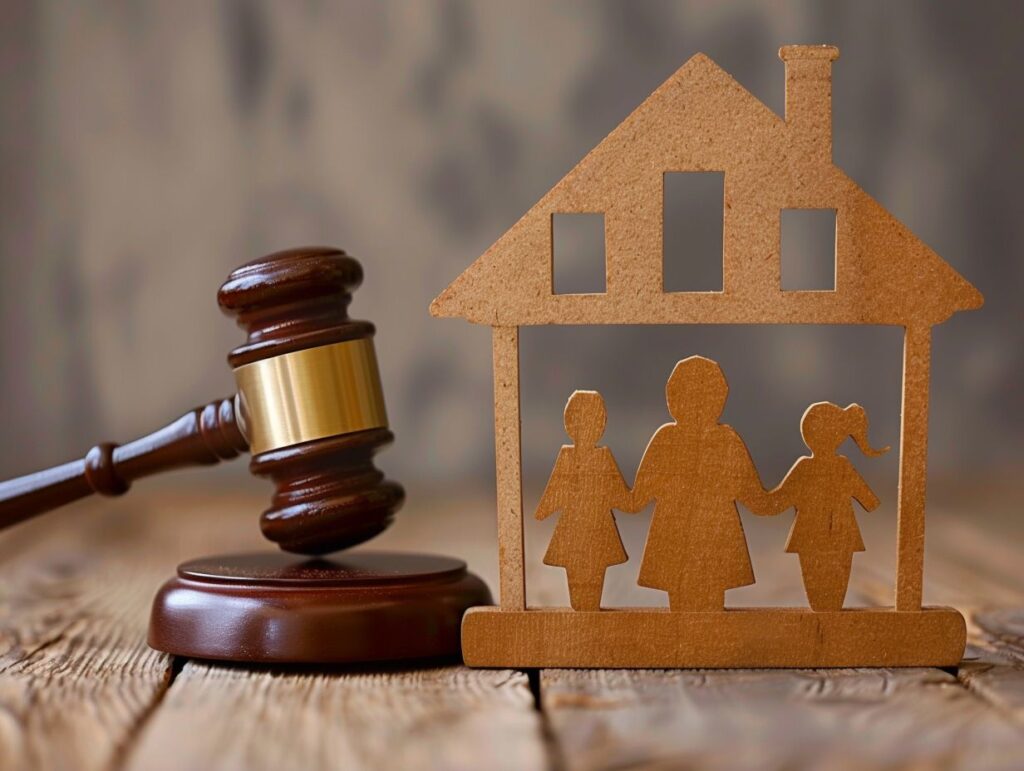Have you ever wondered what a Guardian ad Litem (GAL) is and what role they play in Florida family law cases?
We will explore the appointment process of a GAL, the responsibilities they have towards the court and the child, and the types of cases that require their involvement.
We will also discuss the consequences of not appointing a GAL and provide tips on how parties can effectively work with them.
Learn everything you need to know about GALs in Florida family law cases.
Key Takeaways:

- The role of a Guardian ad Litem (GAL) in Florida Family Law cases is to represent the best interests of the child and provide objective recommendations to the court.
- GALs are appointed by the court and must undergo a thorough evaluation process to ensure they are qualified for the role.
- Parties involved in a Florida Family Law case should be prepared to work closely with the GAL and communicate openly in order to facilitate the best possible outcome for the child.
What is a Guardian ad Litem (GAL)?
A Guardian ad Litem (GAL) acts as a court-appointed advocate for a child in Florida family law cases, ensuring that the child’s best interests are represented during legal proceedings.
Their main responsibilities include conducting comprehensive investigations, interviewing different parties, and providing informed recommendations to the court regarding custody and other factors that impact the child’s well-being, thus playing a significant role in the judicial decision-making process.
What is the Role of a GAL in Florida Family Law Cases?
In Florida family law cases, the Guardian ad Litem (GAL) role involves acting as a neutral representative of the child’s best interests during legal proceedings. The GAL’s responsibilities include conducting thorough investigations into the child’s circumstances by interviewing the child, parents, caregivers, and relevant parties.
Based on these investigations, the GAL provides recommendations to the judge on custody arrangements, visitation schedules, and other decisions affecting the child’s well-being. The GAL serves as the child’s advocate in court, ensuring the child’s voice is heard and considered, with the goal of securing a safe and supportive environment that prioritizes the child’s best interests.
How is a Guardian ad Litem Appointed?
The appointment of a Guardian ad Litem in Florida family law cases is a formal process initiated by the court to ensure that the child’s interests are adequately represented during legal proceedings.
What is the Process for Appointing a GAL in a Florida Family Law Case?
The process for appointing a Guardian ad Litem (GAL) in a Florida family law case typically commences with a motion filed by one of the parties involved or by the court itself.
Once the motion is submitted, the judge will assess the request to determine the necessity of appointing a GAL for the case. In this evaluation, the judge will take into account factors such as the child’s best interests, the complexity of the case, and any potential conflicts of interest.
If the judge deems it suitable to appoint a GAL, a court order will be issued that delineates the GAL’s responsibilities, the extent of their authority, and the requirements for reporting. The GAL must adhere to all legal specifications and guidelines to ensure an impartial and comprehensive evaluation of the situation.
What Factors are Considered when Appointing a GAL?
When selecting a GAL, the court takes into account various factors, such as the person’s qualifications, specialized training, and ability to protect the child’s welfare and best interests.
Typical qualifications for a GAL include a background in law, social work, or a related field, along with experience in child advocacy or family law. Specialized training in areas like child psychology, trauma-informed care, and conflict resolution is essential for handling the complexities of cases involving children.
By ensuring that GALs have these qualifications and appropriate training, the court can trust that the appointed individual will effectively advocate for the child’s needs and well-being throughout the legal process, ultimately serving the child’s best interests.
What are the Responsibilities of a Guardian ad Litem?

The responsibilities of a Guardian ad Litem include a variety of tasks focused on ensuring the welfare of the child. These tasks involve conducting thorough investigations, providing recommendations to the court, and maintaining open communication with all parties involved.
What is the Scope of a GAL’s Investigation?
The scope of a Guardian ad Litem’s investigation in family law cases is broad, encompassing multiple aspects of the child’s life to present a comprehensive view of their needs and circumstances.
This includes investigating matters such as child custody arrangements, assessing visitation rights, reviewing school records related to the child’s development and behavior, and examining medical reports to grasp any current health issues or special requirements. Through exploring these various areas, the GAL seeks to collect thorough information that enables them to offer well-informed recommendations in the child’s best interests within the case.
What is the GAL’s Duty to the Court and the Child?
The GAL is responsible for fulfilling the duty to the court and the child by providing impartial recommendations based on factual findings. This includes ensuring the child’s perspective is taken into account and aiding in judicial decision-making as an unbiased party.
By maintaining objectivity, the GAL can offer an impartial assessment of the child’s situation, free from personal biases or external influences. This objectivity is essential in collecting factual information through interviews, assessments, and research to accurately represent the child’s needs and circumstances.
Ultimately, by accurately conveying the child’s perspective in court proceedings, the GAL acts as a valuable advocate for the child’s best interests, ensuring that their viewpoint is acknowledged and factored into the legal decision-making process.
What Types of Cases Require a Guardian ad Litem?
A Guardian ad Litem is commonly necessary in different types of family law and dependency cases, particularly in high-conflict divorces where the child’s welfare and living situation are in question.
What Types of Family Law Cases Require a GAL in Florida?
In Florida, Guardian ad Litems (GALs) are commonly appointed in family law cases that deal with high-conflict divorces, child custody disputes, and visitation rights issues.
These legal professionals have an important role in cases where there are allegations of child abuse or neglect, substance abuse problems affecting parental suitability, parental alienation, or disagreements regarding the best interests of the children in question.
GALs are responsible for conducting thorough investigations, interviewing all relevant parties, including the children if appropriate, and offering the court unbiased recommendations based on their research. They assist in ensuring that the children’s perspectives are considered and their well-being is given priority throughout the legal proceedings.
What are the Requirements for a GAL in Different Types of Cases?
The qualifications for a GAL can vary depending on the type of case, with dependency cases often requiring more extensive professional credentials and specialized training to adequately comprehend and represent the child’s viewpoint.
These qualifications guarantee that GALs possess the essential expertise to handle the intricacies of cases involving minors, particularly those in vulnerable circumstances.
In divorce and custody dispute scenarios, GALs must also have a profound understanding of family dynamics and child psychology to advocate for the child’s welfare. The specialized training enables them to evaluate each distinct situation and offer recommendations that prioritize the safety and well-being of the children involved.
What Happens if a Guardian ad Litem is Not Appointed?

If a Guardian ad Litem is not appointed in a Florida family law case, there may be significant consequences that impact the child’s welfare and the overall outcome of the legal proceedings.
What are the Consequences of Not Appointing a GAL in a Florida Family Law Case?
Failure to appoint a Guardian ad Litem (GAL) in a Florida family law case may lead to negative outcomes, such as insufficient representation of the child’s welfare and potential biases in judicial decision-making.
This absence of a GAL can result in a lack of comprehensive understanding or advocacy for the child’s needs during court proceedings, ultimately affecting their well-being.
Without a GAL, there is an increased risk of the court’s decisions being swayed by biased viewpoints or incomplete information, resulting in unjust outcomes for all parties involved. Ensuring the presence of a GAL in family law cases is essential for protecting the child’s interests, promoting transparency, and upholding the integrity of the judicial process.
Can a Party Object to the Appointment of a GAL?
In a Florida family law case, a party has the right to object to the appointment of a GAL, but such objections must be raised through proper legal channels and evaluated by the judge.
When a party decides to object to a GAL appointment, they should typically file a formal written objection with the court. This objection should outline specific reasons why they believe the appointed GAL may not be suitable for the case. The judge will then review the objection and consider whether there are valid grounds to support it.
The judge plays a crucial role in determining the appointment of a GAL, taking into account the best interests of the child and ensuring that the appointed GAL is unbiased and competent. Ultimately, the court’s decision regarding the objection will greatly impact the direction of the case.
How Can a Party Work with a Guardian ad Litem?
Collaborating with a Guardian ad Litem requires maintaining open and effective communication, understanding their role in child advocacy, and working together to ensure the child’s well-being throughout the family law case.
What Should a Party Expect when Working with a GAL in a Florida Family Law Case?
When working with a GAL in a Florida family law case, parties can anticipate the GAL making independent recommendations based on the child’s best interests and maintaining a professional approach throughout the legal process.
It is essential for parties involved to realize that the GAL’s primary focus is advocating for the child’s welfare and ensuring their needs are met. The GAL serves as a neutral third party, collecting information from various sources to form recommendations that are not swayed by either parent.
Maintaining a cooperative and respectful attitude towards the GAL is crucial to facilitate a smooth process. Parties should also be prepared to provide honest and transparent information to help the GAL make informed decisions.
How Can a Party Communicate with the GAL?
It is essential to have effective communication with a GAL in a family law case, which can be achieved through regular updates, scheduled meetings, and transparent sharing of relevant information.
Maintaining open lines of communication with the GAL ensures that they are well-informed about the case’s developments and can actively represent the best interests of the child involved.
Providing timely updates and sharing all pertinent details can help build trust and credibility with the GAL, enhancing the overall effectiveness of their role. It is advisable to be honest and forthcoming in all interactions with the GAL to foster a cooperative and collaborative relationship, ultimately benefiting the child at the center of the proceedings.
Frequently Asked Questions

What is a Guardian ad Litem and what is their role in Florida Family Law Cases?
A Guardian ad Litem (GAL) is a court-appointed representative who is responsible for advocating for the best interests of a child in a legal case. In Florida Family Law Cases, a GAL is appointed to represent the child’s interests and make recommendations to the court regarding custody, visitation, and other matters related to the child’s well-being.
Who can be appointed as a Guardian ad Litem in Florida Family Law Cases?
In Florida, a GAL can be any qualified individual, including attorneys, social workers, and mental health professionals. They must complete specific training and be certified by the Florida Court System to serve as a GAL.
What are the responsibilities of a Guardian ad Litem in Florida Family Law Cases?
The primary responsibility of a GAL is to represent the best interests of the child. This includes conducting a thorough investigation of the case, meeting with the child and all relevant parties, and making recommendations to the court about custody, visitation, and other matters that impact the child’s well-being.
How does the court determine if a Guardian ad Litem is necessary in a Florida Family Law Case?
The court may appoint a GAL in a Florida Family Law Case if there is a concern over the child’s well-being or if there is a dispute between the parents that cannot be resolved. The court may also appoint a GAL if there are allegations of abuse or neglect, or if the child has special needs or requires special accommodations.
Can a Guardian ad Litem be removed or replaced in a Florida Family Law Case?
Yes, a GAL can be removed or replaced if there is evidence of bias or conflict of interest. This can be done by either party or by the court. Additionally, a GAL may be removed if they fail to fulfill their duties or if they become unable to continue serving in the case.
What is the difference between a Guardian ad Litem and an attorney in a Florida Family Law Case?
While an attorney represents the legal interests of their client, a Guardian ad Litem represents the best interests of the child. Unlike attorneys, GALs do not advocate for the preferences of the parents or any other party involved in the case. Their sole focus is on the well-being and best interests of the child.























Rate this article:
Average rating 0 / 5. Vote count: 0
No votes so far! Be the first to rate this post.
No Comments yet!